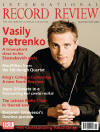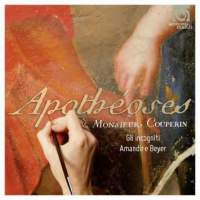Texte paru dans: / Appeared in: |
|
|
Reviewer: Andrew
O'Connor Casual acquaintance with the life and works of François Couperin 'le Grand' might lead one to think of him as the absolute embodiment of the French late‑Baroque style ‑ which favoured elegance and subtlety over Italian fire and drama. In fact, he openly espoused and promoted a new style that took the best of both traditions, an approach he called 'Les Goûts‑réunis'. In his view, the two giants who shaped the rival musical traditions were Corelli and Lully. Ultimately, Couperin could hardly have been more explicit about his mission of musical reconciliation, particularly in his chamber music (excluding his keyboard works). In the 1690s, however, at the outset of his career, dipping toes into the Italian stream was professionally risky; so his earliest experiments in adapting to the transalpine style were issued under a pseudonym. The two
best‑known examples of what Couperin called a 'Sonade' are La Sultane (or ‘Sultanne')
and La Superbe. Both are inspired by Corelli, particularly his trio sonatas,
but
are at the same time
unmistakably French. By the 1720s Couperin was grand enough to be completely
open about his musical mission. Neither work is written in direct imitation of the master being eulogized. Rather they are composed in the lovely mixed style that Couperin championed. At times Italian flavours are foremost, at others French. Lully and Corelli pay each other posthumous musical compliments that would have been unthinkable when they were alive. The movements are full of classical allusions as they describe the elevation of the two composers to the Elysian fields, where they are greeted by the muses of each other's national styles. Couperin was not prescriptive about what instruments were to play his chamber music. In works such as these, violins and/or flutes are the most likely performers of the upper parts. Some recordings add variety by changing instrumentation between movements. Not so with Gli Incogniti. This period instrument ensemble is led by the French violinist Amandine Beyer, who is a former student of Chiara Banchini and has succeeded her as director of the violin master‑class at Schola Cantorum Basiliensis. I recently saw her in concert and was very impressed by her relaxed manner of playing ('chin‑off', of course) and the grace and fantasy she brought to the music. Gli Incogniti's second violinist is a Spaniard, Alba Roca, who studied with, among others, Emilio Moreno. The only other instruments heard on this recording are harpsichord, theorbo and viola da gamba. My comparison recording by Jed Wentz's Musica ad Rhenum ‑ a bargain set of the complete chamber works ‑ supplements the violins with Baroquw flutes and oboes. The all‑string approach works extremely well in the two early 'sonades'. Beyer, Roca and their colleagues generally take slower tempos than Wentz, allowing us to savour fully the delicious sonorities and intertwining threads of these bold, experimental works. At the same time, there is no lack of fire and flair when needed. I rank their performances of La Sultane and La Superbe among the best I have heard. All the same strengths can be found in the considerably longer Apothéoses and there is a myriad of interpretative detail that one needs several hearings to appreciate in full. Nevertheless, I marginally prefer Wentz's ensemble in these two works. The first reason is for simple variety of timbre and texture. Musica ad Rhenurn uses various combinations of transverse flutes, violins and oboes to pleasing effect. The result is an ever‑changing aural spectrum which significantly adds to enjoyment of the works. The second reason is that Gli Incogniti takes both works very seriously, whereas Wentz and his team find some welcome elements of sly humour, particularly in the movement where Couperin depicts the envious grumblings of Lully's rivals. (He was after all, as Couperin must have known, a tyrant with a scandalous personal life.) For all the excellence of the playing, I did find Gli Incogniti's unchanging instrumentation just a little aurally fatiguing in the major works.
Gli Incogniti's debut
recording on Harmonia Mundi boasts a sublime recorded sound and handsome
documentation. 'Minor quibbles aside, this new account of Couperin's
ventures in musical ecumenism is not to be missed. |
|
|
|
|
|
Cliquez l'un ou l'autre
bouton pour découvrir bien d'autres critiques de CD |
|




